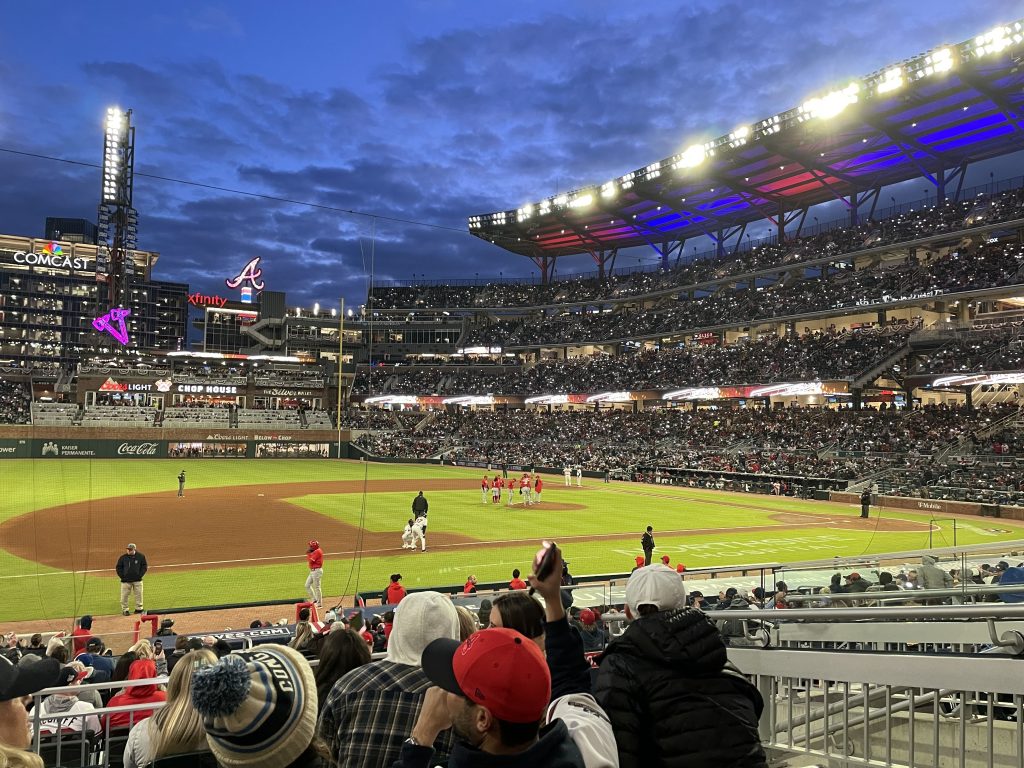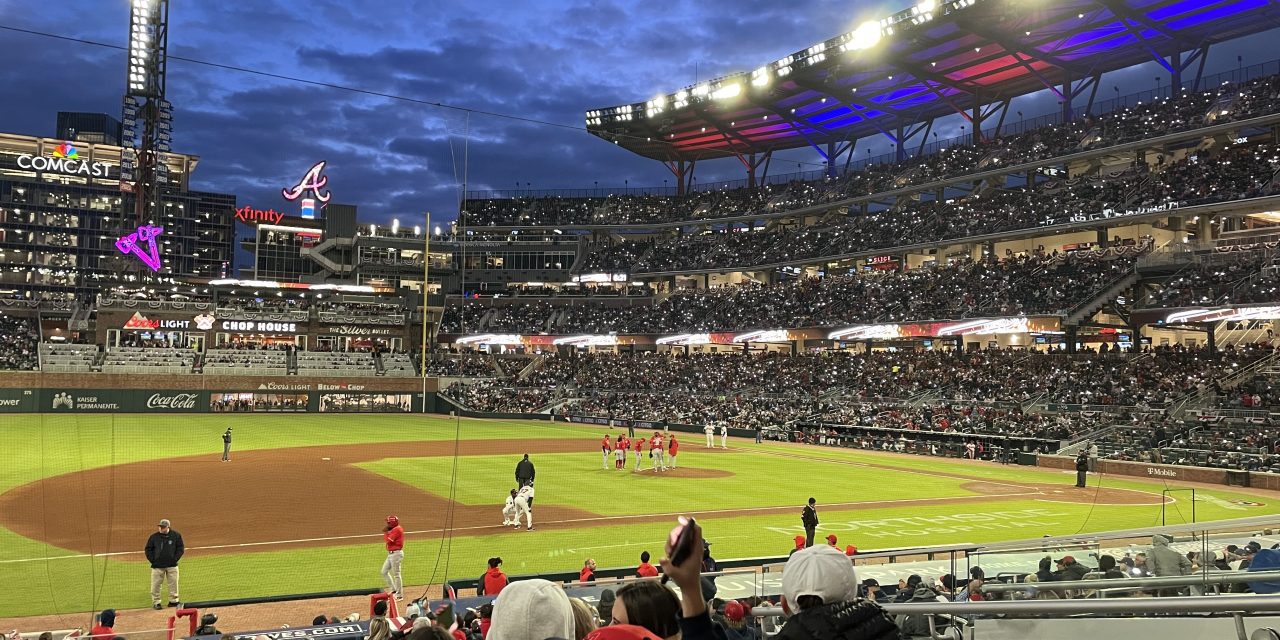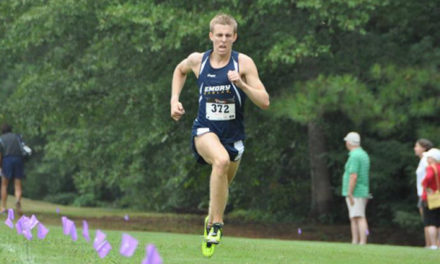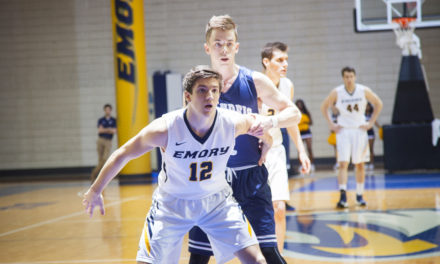
The Atlanta Braves’ Truist Park, the original site of the 2021 Major League Baseball All-Star Game. The festivities were later moved to Denver, Colorado. (Michael Mariam/Managing Editor)
Despite being beloved as one of the best ballparks in America, Major League Baseball (MLB) suddenly moved its 2021 All-Star Game out of Atlanta’s Truist Park just three months before the first pitch was set to be thrown. The move was in response to the passage of sweeping anti-voting legislation pushed through the Georgia State House by Republican politicians and Georgia Governor Brian Kemp. The game was ultimately held at Coors Field in Denver, Co., a state with strong Democratic party ties.
The year prior, the All-Star Game had brought in $89 million for Los Angeles, Calif. Georgia Senate Bill 202, which went into effect in 2021 and targets voters of color particularly in highly populated areas like Atlanta, ended up costing Georgia millions of dollars and an unforgettable fan experience.
In recent months, there have been similar arguments regarding the National Women’s Soccer League (NWSL) and Women’s National Basketball Association (WNBA) expansion in the post-Roe world.
Politically-motivated boycotts are particularly pertinent to women’s sports. Women’s professional leagues are in the throes of expansion, and their players – women and nonbinary people who are often more visibly queer than their counterparts in men’s leagues – are inherently more vulnerable to the United States’ conservative legislation.
And the first instance of sports leagues protesting political decisions by boycotting that I can remember was in 2016, when the National Basketball Association (NBA) pulled their All-Star Game out of Charlotte, N.C. over transphobic “bathroom bills” passed by Republican lawmakers.
These are just a couple examples of American policymakers’ decisions resulting in sports boycotts, revenue loss and iconic games stolen from fans’ backyards.
In the context of expansion, it begs the question, who gets punished in the wake of out-of-touch lawmakers’ harmful political decisions?
As I established in my previous column, I believe sports have an inherent cultural importance that everyone should have the opportunity to experience. If the NWSL, WNBA or other professional leagues decide not to expand to Republican-leaning states, the exclusion of the American South is all but certain. Therefore, the more than 127 million people who live in the South, a large percentage of whom are people of color, will be excluded from said leagues. They will miss the opportunity to watch professional women’s sports because of their lawmakers’ decisions, with which they often disagree.
One could argue that such standoffs between political factions are just a casualty of the American federalist voting system. However, writing off states in which the powerful few impose laws that don’t reflect the views of their electorate plays into the offensive, elitist, classist ideas of a hopeless, backwards South.
When MLB pulled the All-Star festivities out of Atlanta in 2021, former Georgia House Minority Leader Stacey Abrams, one of the most impactful voting rights advocates of the last 50 years, criticized MLB’s decision, citing the major economic repercussions it would bring to Georgia families.
My full statement on @MLB All-Star Game: #gapol pic.twitter.com/mq4DauVQ8B
— Stacey Abrams (@staceyabrams) April 2, 2021
The sweeping avoidance of red states neglects the Southern players and fans who understand these political and cultural intricacies and want to represent a hometown team.
In all honesty, I’m not sure on which side of the issue I stand. As an emphatic supporter of political protests in professional sports, I think listening to players’ opinions is imperative. The recent organizing efforts of the NBA, the WNBA and its player unions and individuals like National Football League quarterback Colin Kapernick and U.S. National Women’s Soccer Team legend Megan Rapinoe have been incredibly impactful campaigns that have changed the tide of social issues. By no means do I believe they should be silenced.
But I also believe that providing access to professional sports should be a more communal process. The data shows that representation matters, and all young athletes deserve to witness hometown heroes who look like them compete at a professional level.
Sports boycotts are especially tricky because their purpose is twofold: they are both acts of political protest and matters of player protection. And it’s more complex than getting to choose where you play, because many players are traded or drafted to cities they didn’t choose. Beyond the players, their partners and families also have to move with them, and inevitably will get caught up in these policies. Not to mention those who work for professional sports teams and may not have enough financial autonomy to access healthcare in another state.
As a woman living in a state with limited access to reproductive health resources, I understand first-hand how scary such situations can be, and it’s not a fear I want others to be forced to endure. At the same time, as a West Coast native now living in the South, I know it’s a region worth caring about.
Ultimately, such controversies encapsulate the debate I constantly wage in my own head: who are sports for?
In professional sports, there is a constant tug between fans who feel entitled to decide competitor’s lives and league operations and athletes who are autonomous individuals that don’t owe fans their livelihood. But no matter how much power ownership and the front office think they have, the patronage and community of loyal fans fuels professional sports, both financially and spiritually.
Although I’m not sure what we should do about this inherently complex problem, I know one thing for certain: we shouldn’t turn our backs on the markets and players that matter, despite what lawmakers may think.
I hope that when professional sports leagues are looking to expand and inevitably encounter boycott conversations, they can find compromises that prioritize the players and fans rather than the all-powerful, out-of-touch billionaire owners and politicians.
Digital Operations & Podcast Editor | Gabriella Lewis (she/her, 23C) is from San Francisco, California, majoring in political science and women, gender and sexuality studies. She hosts the podcast Wheel Talk. Outside the Wheel, she is involved with residence life and voting rights at Emory. She also enjoys national parks, eating ramen and telling people she's from California.






